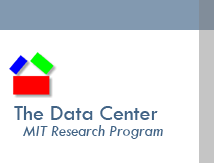


|
|
|
|
|
|
|
|
|
|
|
|
|
|
|
|
|
|
|
|
|
|
|
|
|
|
|
|
|
|
OPENCOURSEWARE MATERIALS FOR ELECTRICAL ENGINEERING AND COMPUTER SCIENCE (COURSE 6)
Artificial Intelligence, Spring 2003
Prof. Tomás Lozano-Pérez,Prof. Leslie Kaelbling
Course Description
"6.034 introduces representations, techniques, and architectures used to build applied systems and to account for intelligence from a computational point of view. Topics covered include: applications of rule chaining, heuristic search, logic, constraint propagation, constrained search, and other problem-solving paradigms, as well as applications of decision trees, neural nets, SVMs and other learning paradigms.*"
Artificial Intelligence, Fall 2002
Prof. Patrick Winston
Course Description
"This course introduces students to the basic knowledge representation, problem solving, and learning methods of artificial intelligence. Upon completion of 6.034, students should be able to: develop intelligent systems by assembling solutions to concrete computational problems, understand the role of knowledge representation, problem solving, and learning in intelligent-system engineering, and appreciate the role of problem solving, vision, and language in understanding human intelligence from a computational perspective.*"
Techniques in Artificial Intelligence
Prof. Leslie Kaelbling
Course Description
"6.825 is a graduate-level introduction to artificial intelligence. Topics covered include: representation and inference in first-order logic, modern deterministic and decision-theoretic planning techniques, basic supervised learning methods, and Bayesian network inference and learning.*"
Prof. Tommi Jaakkola
Course Description
"6.867 is an introductory course on machine learning which provides an overview of many techniques and algorithms in machine learning, beginning with topics such as simple perceptrons and ending up with more recent topics such as boosting, support vector machines, hidden Markov models, and Bayesian networks. The course gives the student the basic ideas and intuition behind modern machine learning methods as well as a bit more formal understanding of how and why they work. The underlying theme in the course is statistical inference as this provides the foundation for most of the methods covered.*"
The Human Intelligence Enterprise
Prof. Patrick Winston
Course Description
"This course is offered both to undergraduates (6.803) and graduates (6.833). 6.803/6.833 is designed to help students learn about progress toward the scientific goal of understanding human intelligence from a computational point of view. This course complements 6.034, because 6.803/6.833 focuses on long-standing scientific questions, whereas 6.034 focuses on existing tools for building applications with reasoning and learning capability. The content of 6.803/6.833 is largely based on papers by representative Artificial Intelligence leaders, which serve as the basis for discussion and assignments for the course.*"
*From OpenCourseWare, published by MIT
Stay informed! Receive regular updates!
Published Six Times Per Year
Copyright 2005 MIT. All Rights Reserved.